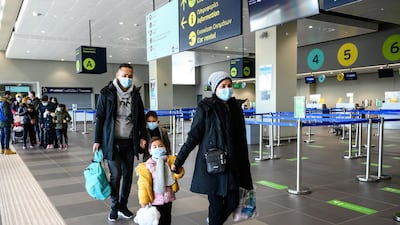Germany has announced it will suspend deportations to Afghanistan, bowing to pressure from humanitarian groups amid a worsening crisis in the country.
It is a significant U-turn for Berlin, which only last week signed a much-criticised letter insisting that deportations must continue despite territorial advances by the Taliban.
Interior Minister Horst Seehofer decided to change course because of the "latest developments in the security situation" and deportations will be paused for the time being, according to his spokesman, Steve Alter.
About 30,000 Afghans in Germany are currently required to leave the country, but Kabul and other groups are urging Europe not to send people back while fighting rages.
An EU official signalled concerns by saying it was "hard to imagine that we would conduct forced return operations for the moment".
An estimated 400,000 Afghans have been displaced from their homes this year, with Taliban fighters thought to control nearly two thirds of Afghan territory.
Mr Seehofer's decision comes a day after a plea by 26 NGOs that Germany "cannot close its eyes" to the crisis and that the rights of refugees should not be sidelined during an election campaign.
The head of one of those organisations, pro-migration group Pro Asyl, said Wednesday's announcement was long overdue.
"Afghans need protection. There are no safe areas in Afghanistan, there is no internal protection from the Taliban," said executive director Guenter Burkhardt.
The NGOs said the humanitarian crisis in Afghanistan was being made worse by a third wave of Covid-19 and showed no signs of improving in parts of the country.
“The rule of law means maintaining principles of human rights. They cannot be up for negotiation during an election campaign," they said.
Election frontrunner Armin Laschet wants to continue to remove Afghans convicted of crimes, but the opposition Greens promised to halt deportations to Afghanistan and Syria.
The Interior Ministry “continues to be of the view that there are people in Germany who need to leave the country, as soon as possible”, Mr Alter said.
Mr Seehofer and five other EU ministers signed a letter this week that insisted that deportations must continue in order to deter future migrants.
The letter from Austrian, Belgian, Danish, Dutch, German and Greek ministers said stopping deportations would “send the wrong signal”.
It led to fierce criticism from watchdogs that said Europe had its priorities wrong and most refugees would be taken in by Afghanistan’s neighbours.

Germany withdrew its troops from Afghanistan at the end of June, following Washington’s lead in ending its 20-year military operations there.
Afghanistan last month urged all European countries to stop deportations, but only a handful, including Sweden and Finland, have agreed to this so far.
A planned deportation from Austria to Afghanistan was halted by the European Court of Human Rights last week.
With many Afghans fleeing their homes, EU countries hope to avoid a repeat of the 2015 refugee crisis during which about a million migrants entered Europe.
A backlash over Germany’s open-door policy to Syrian refugees enabled the far-right Alternative for Germany party to enter parliament at the last election in 2017.
Germany goes to the polls again on September 26 and a new chancellor will take office when a coalition government is formed.
Mr Laschet, the candidate of the centre-right Christian Democrats, said this month that Afghans convicted of crimes should continue to be sent home.
The Greens promised in their manifesto to end deportations to conflict-torn countries such as Syria and Afghanistan.
An EU official said on Tuesday that Brussels wanted to avoid Afghanistan from slipping into a state of civil war and triggering a “massive flow of migration” to Europe’s borders.
Although the Taliban were thought to control 65 per cent of Afghan territory, the official described the situation as challenging but “not desperate”.


